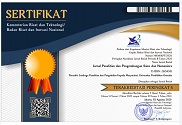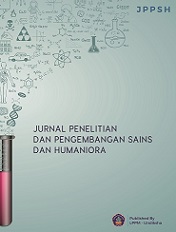Perbedaan Kecenderungan Mahasiswa Akuntansi Pria dan Wanita dalam Mengambil Sertifikasi Akuntan Publik
DOI:
https://doi.org/10.23887/jppsh.v7i1.34649Keywords:
Kecenderungan Mahasiswa, Keyakinan Diri, Sertifikasi Akuntan PublikAbstract
Jumlah anggota Ikatan Akuntan Publik Indonesia tergolong sangat minim dan masih didominasi oleh pria. Penelitian ini bertujuan untuk menganalisis perbedaan kecenderungan mahasiswa akuntansi pria dan wanita dalam mengambil sertifikasi akuntan publik. Jenis penelitian ini merupakan penelitian kausal. Populasinya yaitu mahasiswa aktif Program Studi Akuntansi, sejumlah 932 mahasiswa. Sampel menggunakan rumus Slovin dengan tingkat keyakinan 95%, dan ditemukan sampel minimal sejumlah 280 mahasiswa. Data dalam penelitian ini adalah data primer yang dikumpulkan langsung dengan computer delivered survey melalui Google Form. Teknik analisis data menggunakan analisis kuantitatif dan kualitatif. Uji regresi sederhana dilakukan untuk mengetahui pengaruh keyakinan diri dan hasil yang diharapkan terhadap kecenderungan mahasiswa mengambil sertifikasi akuntan publik. Penelitian ini menemukan bahwa ada perbedaan kecenderungan mahasiswa akuntansi pria dan wanita dalam mengambil sertifikasi akuntan publik. Perbedaan tersebut disebabkan oleh perbedaan keyakinan diri dan hasil yang diharapkan. Pria memiliki kecenderungan yang lebih tinggi untuk mengabil sertifikasi akuntan publik. Hasil penelitian ini diharapkan dapat mendorong para pendidik untuk mendukung keyakinan mahasiswa terhadap dirinya dan memberikan wawasan mengenai berbagai hal menarik yang bisa diperoleh dalam suatu.
References
Alshahrani, A., Ross, I., & Wood, M. I. (2018). Using social cognitive career theory to understand why students choose to study computer science. International Conference on Educational Research, 205–214. https://doi.org/10.1145/3230977.3230994.
Baglama, B., & Uzunboylu, H. (2017). The relationship between career decision-making self-efficacy and vocational outcome expectations of preservice special education teachers. South African Journal of Education, 37(4). https://doi.org/10.15700/saje.v37n4a1520.
Baya’a, N., Daher, W., & Anabousy, A. (2019). The Development of In-Service Mathematics Teachers’ Integration of ICT in a Community of Practice: Teaching-in-Context Theory. International Journal of Emerging Technologies in Learning, 14(1), 125–139. https://doi.org/10.3991/ijet.v14i01.9134.
Brown, S. D., & Lent, R. W. (2016). Vocational psychology: Agency, equity, and well-being. Annual Review of Psychology, 67, 541–565. https://doi.org/10.1146/annurev-psych-122414-033237.
Casas, Y., & Blanco-Blanco, Á. (2017). Testing Social Cognitive Career Theory in Colombian adolescent secondary students: a study in the field of mathematics and science. Revista Complutense de Educacion, 28(4), 1173–1192. https://doi.org/10.5209/RCED.52572.
Darling, S., Dawson, G., Quach, J., Smith, R., Perkins, A., Connolly, A., Smith, A., Moore, C. L., Ride, J., & Oberklaid, F. (2021). Mental health and wellbeing coordinators in primary schools to support student mental health: protocol for a quasi-experimental cluster study. BMC Public Health, 21(1), 1–14. https://doi.org/10.1186/s12889-021-11467-4.
Flores, L. Y., Navarro, R. L., & Ali, S. R. (2017). The State of SCCT Research in Relation to Social Class: Future Directions. Journal of Career Assessment, 25(1), 6–23. https://doi.org/10.1177/1069072716658649.
Fouad, N. A., & Santana, M. C. (2017). SCCT and Underrepresented Populations in STEM Fields: Moving the Needle. Journal of Career Assessment, 25(1), 24–39. https://doi.org/10.1177/1069072716658324.
Garriott, P. O., Navarro, R. L., & Flores, L. Y. (2017). First-Generation College Students’ Persistence Intentions in Engineering Majors. Journal of Career Assessment, 25(1), 93–106. https://doi.org/10.1177/1069072716657533.
Grigg, S., Perera, H. N., McIlveen, P., & Svetleff, Z. (2018). Relations among math self efficacy, interest, intentions, and achievement: A social cognitive perspective. Contemporary Educational Psychology, 53, 73–86. https://doi.org/10.1016/j.cedpsych.2018.01.007.
Gulseren, D. B. (2019). Career Regret among University Students from Turkey: A Test of the Social Cognitive Career Theory. Canadian Journal of Career Development, 18(2), 4–16.
Indriyani, N., Santoso, S., & Khresna, B. S. (2019). Pengaruh Efikasi Diri dan Kemandirian Belajar ter-hadap Prestasi Belajar Spreadsheet Siswa Kelas X Akuntansi di SMK. Jurnal Tata Arta UNS, 5(3), 67–82. https://jurnal.uns.ac.id/tata/article/view/39895.
Jiang, Y., Zhao, L., Yuan, M., & Fu, A. (2017). Identification and changes of different volatile compounds in meat of crucian carp under short-term starvation by GC-MS coupled with HS-SPME. Journal of Food Biochemistry, 41(3), 1–16. https://doi.org/10.1111/jfbc.12375.
Juniarti, E., Ahyani, N., & Ardiansyah, A. (2019). Pengaruh Kepemimpinan Kepala Sekolah Dan Efikasi Diri Guru Terhadap Kinerja Guru. Reslaj : Religion Education Social Laa Roiba Journal, 1(3), 193–199. https://doi.org/10.47467/reslaj.v1i2.108.
Kusumawati, E., Diana, & Wahyuningsih, D. (2020). The effectiveness of social cognitive career theory on career decision making. Jurnal Bimbingan Dan Konseling, 7(2), 107–116. https://doi.org/10.24042/kons.v7i2.7214.
Lent, R. W., Ireland, G. W., Penn, L. T., Morris, T. R., & Sappington, R. (2017). Sources of self-efficacy and outcome expectations for career exploration and decision-making: A test of the social cognitive model of career self-management. Journal of Vocational Behavior, 99, 107–117. https://doi.org/10.1016/j.jvb.2017.01.002.
Li, J., Mau, W.-C. J., Chen, S.-J., Lin, T.-C., & Lin, T.-Y. (2019). A Qualitative Exploration of STEM Career Development of High School Students in Taiwan. Journal of Career Development. https://doi.org/10.1177/0894845319830525.
Li, Y. I., Hazler, R. J., & Trusty, J. (2017). Relational Self-Construal as a Moderator of Social Support in Career Decision Making. Career Development Quarterly, 65(1), 44–56. https://doi.org/10.1002/cdq.12079.
Liguori, E. W., Bendickson, J. S., & McDowell, W. C. (2018). Revisiting entrepreneurial intentions: a social cognitive career theory approach. International Entrepreneurship and Management Journal, 14(1), 67–78. https://doi.org/10.1007/s11365-017-0462-7.
Mau, W. C. J., Chen, S. J., & Lin, C. C. (2021). Social cognitive factors of science, technology, engineering, and mathematics career interests. International Journal for Educational and Vocational Guidance, 21(1), 47–60. https://doi.org/10.1007/s10775-020-09427-2.
Pérez-López, M. C., González-López, M. J., & Rodríguez-Ariza, L. (2019). Applying the social cognitive model of career self-management to the entrepreneurial career decision: The role of exploratory and coping adaptive behaviours. Journal of Vocational Behavior, 112, 255–269. https://doi.org/10.1016/j.jvb.2019.03.005.
Riewestahl, E. (2017). Explaining Gender Differences in Realistic Interests with Social Cognitive Career Theory. XULA Digital Commons, 15(1), 1–15. https://digitalcommons.xula.edu/xulanexus/vol15/iss1/2.
Robinson, K. A., Perez, T., White-Levatich, A., & Linnenbrink-Garcia, L. (2020). Gender differences and roles of two science self-efficacy beliefs in predicting post-college outcomes. Journal of Experimental Education. https://doi.org/10.1080/00220973.2020.1808944.
Santos, D., & Miguel., L. (2020). Becoming a pre-school and elementary school educator: How do male teachers describe their career decision and career development from the perspective of the social cognitive career approach and human resource management. Journal of Education and E-Learning Research, 7(2), 159–166. https://doi.org/10.20448/journal.509.2020.72.159.166.
Schoenfeld, J., Segal, G., & Borgia, D. (2017). Social cognitive career theory and the goal of becoming a certified public accountant. Accounting Education, 26(2), 109–126. https://doi.org/10.1080/09639284.2016.1274909.
Schunk, D. H., & DiBenedetto, M. K. (2020). Motivation and social cognitive theory. Contemporary Educational Psychology, 60. https://doi.org/10.1016/j.cedpsych.2019.101832.
Stipanovic, N., Stringfield, S., & Witherell, E. (2017). The Influence of a Career Pathways Model and Career Counseling on Students’ Career and Academic Self-Efficacy. Peabody Journal of Education, 92(2), 209–221. https://doi.org/10.1080/0161956X.2017.1302217.
Tatum, A. K., Formica, L. J., & Brown, S. D. (2017). Testing a Social Cognitive Model of Workplace Sexual Identity Management. Journal of Career Assessment, 25(1), 107–120. https://doi.org/10.1177/1069072716659712.
Umar, I., & Sabo Bello, M. (2019). The relationship between accounting students’ self-efficacy beliefs, outcome expectations and intention to become Chartered Accountants. East African Scholars Publisher, 2(7), 376–381. https://www.researchgate.net/publication/339771281.
Wegemer, C. M., & Eccles, J. S. (2019). Gendered STEM career choices: Altruistic values, beliefs, and identity. Journal of Vocational Behavior, 110, 28–42. https://doi.org/10.1016/j.jvb.2018.10.020.
Wijayanti, I. A. D., & Supartha, I. W. G. (2019). Pengaruh Kepemimpinan Transformasional Terhadap Kreativitas Karyawan Dimediasi Efikasi Diri Kreatif Pada Pt. Aura Bali Craft. E-Jurnal Manajemen Universitas Udayana, 8(3), 1230. https://doi.org/10.24843/ejmunud.2019.v08.i03.p03.
Woo, H., Lu, J., Henfield, M. S., & Bang, N. (2017). An Exploratory Study of Career Intentions in Academia: Doctoral Students in Counselor Education Programs in the U.S. Journal of Asia Pacific Counseling, 7(1), 79–92. https://doi.org/10.18401/2017.7.1.7.
Zarrin, A. (2020). Predicting of Occupational Consideration by Interest, Self-efficacy and Outcome Expectations among Students. Journal of Preventive Counselling, 1(3), 50–60.
Downloads
Published
Issue
Section
License
Copyright (c) 2023 Lukas Aland Prajetno

This work is licensed under a Creative Commons Attribution-ShareAlike 4.0 International License.
Authors who publish with the Jurnal Penelitian dan Pengembangan Sains dan Humaniora agree to the following terms:
- Authors retain copyright and grant the journal the right of first publication with the work simultaneously licensed under a Creative Commons Attribution License (CC BY-SA 4.0) that allows others to share the work with an acknowledgment of the work's authorship and initial publication in this journal.
- Authors are able to enter into separate, additional contractual arrangements for the non-exclusive distribution of the journal's published version of the work (e.g., post it to an institutional repository or publish it in a book), with an acknowledgment of its initial publication in this journal.
- Authors are permitted and encouraged to post their work online (e.g., in institutional repositories or on their website) prior to and during the submission process, as it can lead to productive exchanges, as well as earlier and greater citation of published work. (See The Effect of Open Access)









